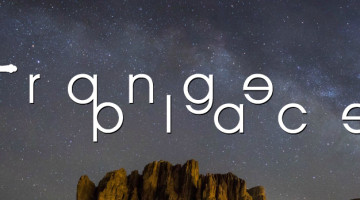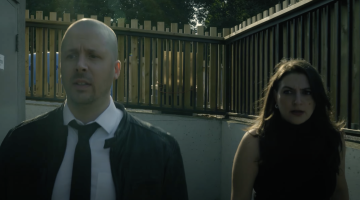Just a warning: this article scares the crap out of me.
You see, I’ve been working on this article for months, while also prepping for the new season of our webseries and the whole time I’ve been thinking: “what if this advice sucks and Season 2 gets no views?” But, like with any marketing I have done so far, everything is trial and error. Promotion is a fluid process. It’s not easy getting eyeballs on your series and this article is just a way for me to share what’s worked and hasn’t worked for us so far. With that in mind, I’ve put together a few tips that will hopefully help you with your own marketing and, hopefully, will make the rest of us ask: “how the hell are they doing so well?”
1. PERSISTENCE IS KEY
We never thought we had to worry about marketing. When we first started Red Shirts, my co-creator Ben and I thought this series would be a slam dunk considering the Star Trek inspiration behind our show. We figured we were a shoo-in to grab the sci-fi community and go viral.
Still waiting on that last one.
The truth is that the Internet is a wonderful and vibrant place where cat videos reign supreme. Promoting your web series is a job. It’s the job I never really thought about when we were initially writing the series, or when we were producing or when I was directing it, but it’s one I’ve probably worked on the most. And, if you’re anything like me, you’ve been chosen for this task because absolutely everybody else ran from it like a ticking time bomb and you have no money to hire someone to run a marketing campaign.
So, here’s the thing: it takes a lot of time, a lot of effort, and it’s constant. Just know that going in. It’s a 24-hour-a-day job. And even if you’re working on it with every spare moment you have, it’s still probably not enough.
2. BUILD AN AUDIENCE RIGHT AWAY
Yes, I mean have something to show before you have anything to show. Yes, I know how this sounds.
This is the chicken and the egg debate for webseries creators: how can I build an audience for a show that doesn’t exist yet? It’s a good question and the answer lies not just in creating a Facebook, Twitter or Tumblr page but in thinking about original content for your show that isn’t the show itself.
For our show, we self-financed our first season and knew we needed to crowdfund to raise money to do Season 2. So, during the shoot for our crowdfunding video, we shot Q&As with our lead actors in character and turned those into short clips that we posted on our Facebook page, prior to ever airing a trailer or an episode. We also promoted those clips through Facebook which is a bit pricy for what you get but it did raise our profile and started to spread the word despite the fact that we had no actual content or, at that point, even a YouTube page.
Here’s what we did wrong: once those clips were gone, we were still working on our episodes so we couldn’t turn all this sudden attention into instant views. The clips helped promote our Indiegogo page, which was nice, but at the same time we were running our crowdfunding campaign we were also shooting our 3 episode season (CROWDFUNDING TIP: this is a terrible idea because we did not have time to promote our campaign during production), so when the clips ran out, so did our momentum.
For our upcoming, 2nd season, we are running a series of promos leading up to the release, which we had to budget for and schedule half a day for shooting, but it will hopefully pay dividends when the new episodes debut. There are a variety of other things you can do to build your brand, such as podcasts (which I wish we had time to do) or — as fellow webseries Super Knocked Up has done so well — a Google Chat series.
We’ve also released stills from the shoots (while in production), trailers, anything to keep the conversation going and to advance the online presence of your series. The point is to become a destination for your fans. You have to keep a presence going or everyone will move on from you to something else.
3. SOCIAL MEDIA IS YOUR FRIEND
Social media can you help you promote your webseries! You heard it here first! You’re welcome!
OK, so we’re officially telling things you already know now, but, if you haven’t created a Twitter, Facebook or Tumblr page, you should probably go ahead and leave this page and go do all of those things right now. For those still with me, let’s talk about using social media.
I don’t profess to be an expert on Tumblr (our page is severely underutilized), but I feel pretty good about Twitter and it’s where we’ve found our greatest success in promoting our series. However, we did this in a controversial way:
We @ mentioned websites to watch us. I know, I know.
Now this is a slippery slope. Plenty of people will tell you this is the single, most annoying way of promoting your show and I’m not trying to encourage everyone to just @ mention websites ad nasueum, but I have to be honest and admit that this did work for us. To a point.
When we were still in the crowdfunding/post-production phase of Season 1, I reached out to TrekMovie to watch our teaser trailer, and they eventually responded with a full article about us. This is also how we got ScreenRant to eventually pick our Season 1 episodes for their daily “Geek Picks” and how we introduced ourselves to SciFiMafia and other sites as well. I’m sure we also annoyed the crap out of other sites — as well as our own followers — by doing this. For instance, a few persistent @ mentions got William Shatner to block us and while that’s a point of pride for us, it’s also a cautionary tale of what @ mentioning people can do.
It’s a double-edged sword, that @ mention. So let’s add that it’s really, really important to use Twitter for more than just promotion. Get active. Favorite things you like. Reply to people. Create honest conversation. Take part in the webseries community (#webserieschat every Wednesday at 11am PT), foster relationships with those that might be interested in your series, either professionally or personally, and look at your Twitter (and all of your social media outlets, really) as a place for you not just to promote your show but build a community. We’ve been fortunate to get a lot of press opportunities through Twitter, but we’ve also had an opportunity to meet a lot of great people and to solicit advice and learn about all aspects of creating and making a webseries.
I should add that writing a press release and getting relevant websites to cover your series should also be a priority. Facebook has been great for us as well, particularly when we’ve released an episode, as we’ve spent money promoting those posts. I hesitate to advocate Facebook’s post-boosting, but I can’t deny that it’s been helpful, even if the financials don’t seem to even out (in my opinion).
Also, figure out Reddit. Fast. I can’t seem to crack it, but I keep trying. Again, don’t just promote. Take part in the online community (or get banned as my co-creator Ben found out the hard way).
4. HAVE MONEY AVAILABLE FOR AWARDS AND FESTIVALS
This is pretty self-explanatory. Festivals are a great place to have your worked screened and meet fellow creators. Some fests even offer you the opportunity to submit your show for several awards, which, if you win them, looks impressive. It may be a festival no one has heard of, but it doesn’t matter. If you have an award, people look at you different. Perception is reality.
By the way, festivals are expensive and often reject stuff, but don’t let that stop you. Red Shirts has not received a single award. Nothing happens overnight (unless, of course, it does).
5. HIT THE PAVEMENT
Go local. You don’t have to be in Los Angeles or New York with a webseries, which is what makes working on webseries so great. In fact, as we are based in Los Angles where everyone is literally screaming “LOOK AT ME” all the time, it’s probably for the best that you aren’t from a big town. Take advantage. Put together a live show. See how you can screen your series at various theaters in town, or even if they have a show where webseries are screened (shout out to Westside Theater’s The Web Show Show).
There are a million ways to take advantage of where you live and get people excited about your project. Start small and build up. It can be hard to cast a wide net. It takes a lot of time and may never work. Take that weird idea – “what if we did this?” – and act on it. The worst thing that can happen is that it doesn’t work and you try something else.
It’s a big Internet out there. Everyone can have their piece of the digital pie, but it can take a lot of time and dedication to get it. When we started Red Shirts years ago, we really thought we would take off in no time at all. At the same time, I’m proud of every single view we have for our episodes, trailers and extras. They’re not as easy to get as it seems.
Good luck out there. Please watch our show and don’t be a stranger (@Redshirts3)!











Nice Article! Enjoyed it, sympathized, empathized, raised eyebrows (sometimes just one), and lastly, hatched some plans.